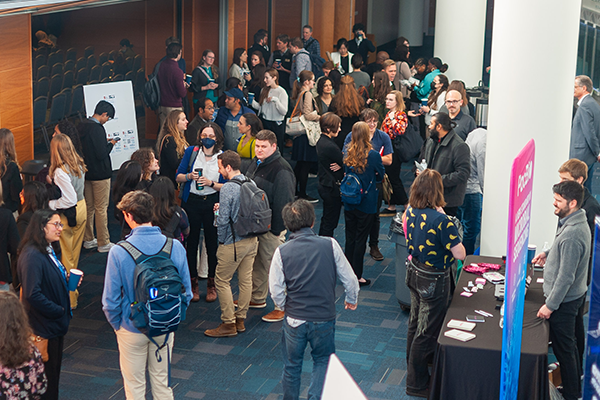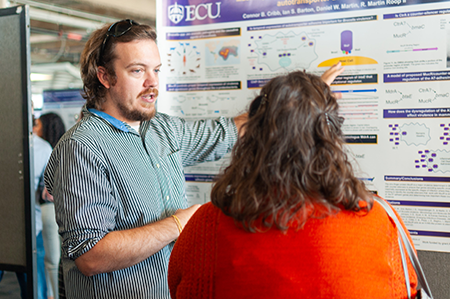
The North Carolina American Society for Microbiology (NC-ASM) had record attendance at its annual meeting Saturday, hosted by the Duke Microbiome Center, attracting more than 300 researchers from across the Southeast.
Those studying how Klebsiella pneumoniae infections outsmart antibiotics and others using gene editing to understand how good bacteria supports gut health, digestion, and the immune system earned top honors, reinforcing the role of microbiologists as guardians of human health.
There were 134 presentations focused on the ever-changing microbial world. Event organizer Jason W. Arnold, PhD, assistant director of the Duke Microbiome Center and assistant professor in the Duke Department of Molecular Genetics and Microbiology, said students and graduate students presented exceptional work.
Arnold was elected president of NC-ASM and began his term during the event.
The exchange of ideas included strategies for infection control both in hospital settings and the real world, vaccine development, and environmental conservation. It was also a unique opportunity for undergraduate and graduate students to earn well-deserved prizes to provide essential support for early career researchers.
The 22 academic and industry groups represented included the University of North Carolina at Chapel Hill, UNC-Charlotte, Duke University, East Carolina University, Appalachian State University, North Carolina State University and North Carolina Central University.

An attendee from Texas A&M came to network with North Carolina microbiologists in hopes of pursuing graduate education in the Research Triangle.
Distinguished lecturer Karen Maxwell, PhD, of the University of Toronto, took center stage to delve into the phage-host evolutionary arms race. In her keynote address she explained the constant battle between phages, viruses that infect bacteria, and the mechanisms that bacterial hosts use to defend against these phage attacks.
Maxwell’s work at the intersection of host-microbe research stood out as one of the central themes of the event. This year, the NC-ASM also ventured into medical and clinical microbiology, as well as exploring the microbiome and environmental microbiology.
Award Winners
Best Student Flash Talk – Lily McKay of the Department of Microbiology and Immunology – UNC Chapel Hill; Fighting for Air: Minimal requirement for the Bordetella respiration in the respiratory tract.
Best Graduate Poster -- Ourania Raftopoulou of North Carolina State University; Genome engineering of Bifidobacterium lactis using the endogenous Type I-G CRISPR-Cas System.
Best Undergraduate Poster -- Kai Davis of East Carolina University; Evaluating plant-microbe associations in response to environmental stressors to enhance wetland restoration.
Best Graduate Talk -- Giovanna Hernandez of Wake Forest School of Medicine; The role of aerobactin on the virulence and translocation of hypervirulent Klebsiella pneumoniae following gastrointestinal colonization.
Best Undergraduate Talk -- John Hinkle of the Department of Earth, Marine, and Environmental Sciences at UNC Chapel Hill; Molecular survey of methane-cycling archaea in methane-soaked subsurface sediments (Guaymas Basin, Gulf of California).
Kai Davis, of East Carolina University, Rachel DeMez of UNC Chapel Hill and A'lyiha Beard of Winston Salem State University received National ASM Membership Awards.